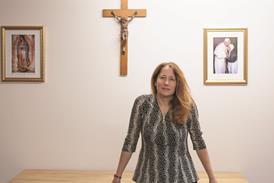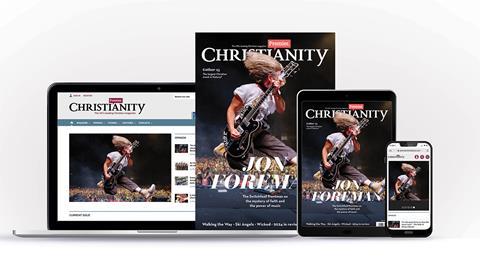Single Christians who want to find a partner have a limited number of options available to them. Single Christian women significantly outnumber single Christian men. Using a dating agency used to be frowned on and regarded as something to be ashamed of. This is changing. Increasing numbers of agencies have launched to help Christians to meet, make new friends and discover their life partner – and the Internet is helping to connect potential Mr & Mrs.
“If you go to a party there will be lots of new people to meet,” says Jackie Elton, founder of Christian Connection. “But as you start talking you realise that many are married, are not Christians, or don’t share the same interests as you. By joining a Christian dating website, you know that through the internet, the ‘party’ will be full of single Christians of the right age and background for you to get to know.”
David ’s story?
“I met lots of people in my job as a vicar,” says David Robertson, “but they were rarely single and often did not share my faith. I knew that by joining an introduction agency, I would be going into a ‘room’ where everyone there would meet my criteria. Then it was a case of getting to know them and building a friendship.”
There are twice as many single women as single men in the church today and, while the church is continuing to preach to an assumed audience of parents with children, there will continue to be a perceived pressure for some women, in particular, to seek a partner - a believing partner. The Internet allows them to broaden their search. And with the Internet, it is all about numbers, about how many new people you can look at, coming onto the site each day.
“The stigma about Internet dating is no longer there,” says Chris Chetwood, who launched linkchristians.co.uk in 2005. “You won’t find sites full of ‘geeks’. There are doctors and lawyers, and attractive people. A bright, goodlooking Christian girl doesn’t need to go on the Internet to find a man, but she chooses to do so. If a girl is dating someone at church, the congregation often has them married off straightaway.”
Once you’ve taken the plunge emotionally to search online, the next hurdle is choosing which agency to join. You may be overwhelmed by the options if you Google for ‘Christian Singles’, but you could start by looking at the adverts in Christian publications. ??There are a variety of different services available. You can choose from Internet dating, introduction agencies, social events and holidays for singles, speed dating, international groups, local clubs... the list goes on. And the prices will vary, too. Some will offer trial periods and this is a good way of becoming familiar with the way the site operates, and the sort of people it attracts. Be wary of sites which claim to be free as sometimes there are hidden charges, or the site may not be very helpful.
Not all ‘Christian’ agencies are necessarily operated by parent companies that have a strong faith ethos. Take a look at the questions on a sample profile. Are they asking participants to share views on their faith? Do the people running the site cover the business with prayer? Does the site have a statement of faith? What denominations are welcome on the site?
Probably the best means of selection is by personal recommendation. While friends and family may not volunteer the fact that they have tried dating services, if you discreetly ask around you may be surprised by just how many people have had a positive experience. ??David Robertson was bringing up four teenage children alone after a divorce. When he felt he was ready for a new relationship, and that it was scripturally acceptable for him to do so, he realised that he didn’t know any single women. One of his friends suggested that he tried FriendsFirst and two years later he was married.
“As a middle-aged vicar with four children, I was surprised to be contacted by anyone but in the first four months, I had made contact with 40 people,” he says. “With some it was clear it wasn’t going any further, but with others there was a good basis for friendship.”
David was realistic in his approach to the agency from the outset. He says he didn’t expect instant attraction. “If you think you have the basis for friendship then that is a good measure of whether to meet up.”
As a divorcee, David found, too, that he had a number of issues to deal with as a result of entering another relationship, and his experience has led him to publishing a book Risking Romance Again on the subject (see reviews). “There are lots of books which address the external issues of dating - making yourself more physically attractive by losing weight, changing your hairstyle, flirting etc. But there was nothing from a Christian point of view about dating and the personal issues it raises,” he explains.
Magazine articles tend to refer to getting back into the habit of dating, but for David and many like him, dating wasn’t something he had any experience of. “My relationships in the past had arisen through friendships, or people already known to me. I had never been on a formal date. Dating at any age is scary. Dating after divorce is in another league.”?
The issue of trust ?For anyone who has been through a painful relationship breakdown, trust is a big issue, and anyone entering Internet dating needs to be resilient and realistic. While most sites will undertake a certain amount of policing to ensure no one is abusing the service, participants need to use some common sense.
“Dating on the net is just like dating in the real world,” says Sam Moorcroft, founder of ChristianCafe.com, based in Canada. “You could meet someone in your church and find them charming but they could be trying to persuade you they are someone they’re not. ??“Sometimes people are naive because they are going on the net in the comfort of their own home. They often have a fantasy and through emailing project their desires on someone, missing all the clues. But that can happen in real dating too.”
All the good dating sites and agencies give their clients guidance on how to meet people safely; the etiquette of continuing, and breaking off, communication; and on improving your profile to get the best results. The New Day introduction service has produced a book – Table for Two? which includes all sorts of useful advice about dating.
While the number of marriages achieved through a dating service may seem to be a measure of its success, and the websites will provide testimonials for you to read, this is not the only measure of a good site. People don’t always feedback to the site news of how their relationship has developed, while some don’t join purely for romance. Some people use these sites to make new friends particularly if they have relocated to a new city due to a job/career change. Others find that after pursuing a dating episode, and not meeting someone special, they feel more content in their singleness. ??Joy, 38, went on a speed dating event held at the Greenbelt festival four years ago. Having always been single, she saw it as another opportunity to push doors. Despite it being unsuccessful, she now considers herself more comfortable and fulfilled as a single person. “I thought speed dating was worth exploring. Greenbelt means a lot to me so I was excited at the thought of meeting some like-minded men who would see it in the same way,” explains Joy. “I didn’t discover any men who lived their Christian life as I do, though, and that was disappointing.” At the end of the event, Joy compared notes with a girl she had met in the queue. Four years later they visit Greenbelt together annually, as friends. “Interestingly, I didn’t tell anyone that I had been speed dating. I didn’t come away from it feeling miserable. Other people did get on well; it just wasn’t my time. Some women were expecting so much from the event,” she says. “I wouldn’t say to people don’t do it; just be realistic about what you are expecting from it.”
The major Christian festivals like Greenbelt, Spring Harvest and New Wine have all now run speed dating events which have proved very popular. Increasing numbers of single people who go to Bible weeks and festivals appreciate the possibility of meeting someone special. While speed dating may have raised eyebrows in the past, it is a much more accepted concept now. “As the number of single people grows, it’s important that all the big festivals find ways of creating a welcoming environment for people on their own,” says Jackie Elton. ??Christian Connection has run several speed dating events at festivals in addition to regular social events in London. The Network runs various holidays, weekend breaks and day events as part of its service. Some people are happier with this, more traditional, way of meeting. However, it is up to you to mingle, so if you’re not good at working a room you may not get to meet everyone. Also the events are open to anyone (a few are age specific) so you will meet a wide range of people and not just those with whom you have common interests. They might also have travelled a long distance to attend, so if you want to meet again this might be an issue. But with dating services, generally, you can trawl for people all over the world.
Long-distance love ?“Being online is a double-edged sword,” says Sam Moorcroft, of ChristianCafe.com. “You have the world on your desktop which means you are less likely to connect with someone in your own geographical area – but does that mean you shouldn’t meet them?”
Simon met Heidi through the Internet. He lived in Cardiff and she was in Dudley, but after four months of emailing, phoning and meeting, he relocated to be nearer to her. “We had both been in long distance relationships before and rather than constantly emailing and building up an unrealistic image of each other, we wanted to get to know each other properly as soon as possible,” says Heidi.
Simon was in a church of 11 people, and the only single guy under 40. His best friend had just got married and wanted Simon to do the same, so he sent the forms for Simon to join ChristianCafe.com. Heidi was spending a quiet evening in with her flatmate, trying to track down someone they had seen on TV. She stumbled across ChristianCafe.com, liked the questions asked of people on the site and decided to try it out.
“The church should encourage Internet dating,” says Heidi. “So many people want to meet a partner and dream of that magical moment spotting someone across a room. But it is proving difficult to meet people in churches and Christians in nightclubs. What’s to stop God using the Internet to bring people together?”
Heidi and Simon married two years after meeting and now have a baby. Their story has encouraged many of their friends to try Internet dating for themselves.
Introductions to a wider choice
The following list of Christian dating agencies is far from exhaustive – however it does give you a feel for the variety available.
?Founded in 1998 by Sam Moorcroft with his brother in Toronto, Canada, the Christian Cafe spans Canada, the USA and Europe. They claim over 1m have tried the site since its launch in 1999. Sam had moved to Toronto for a job which subsequently made him redundant. With few friends in the area and time on his hands he began to search the Internet to find friends and a church to attend. He came across the dating sites and was surprised that they attracted well-adjusted and attractive women.
?Chris Chetwood had been through the whole dating scene and found that it was a problem meeting single girls in general, but to find Christian girls was even more difficult. After 12 months researching Internet dating, and putting together a team of Directors and support staff, he decided to launch his own site in 2005. Linkchristians has 6,500 members, and claims 20-30 join each day. The company focuses solely on the UK. The site is policed and users are asked to complete two essay questions in their profile to discourage people browsing the site from curiosity.
?The New Day Christian introduction agency was formed in 1989 by Sue Saxon when she was faced with the dilemma of not knowing what to recommend to close friends who wanted to meet new partners. “Our introduction agency provides a personal touch,” she says.
“None of our members would want to be pasted on an electronic list, which is all Internet dating is. We match people according to their characters and will only have around 1,000 members at any one time to ensure we deliver quality of service. “We run the agency prayerfully,” says Sue, “praying for everyone who joins us, and we aim to act with integrity and honesty.”
?The Christian Connection Internet dating site was launched in 2000 by Jackie Elton, with the Christian-led company, Widernet. It is open only to Christians in the UK and Ireland, but also has sites for Australia and Germany. They report that around 15-25 people sign up each day. Features include instant chat, communication by internal email or SMS, and through the events site,www.eventsforchristians.co.uk runs regular events around the country, ranging from speed dating, lock and key, quiz nights, comedy nights and parties. In February it organised a speed dating event on Valentines night for Coventry Cathedral and in August for Greenbelt. New ventures have included a site for people wanting to find flatmates.
Friends 1st: ?this ‘off line’ introduction service was launched in 1999 by Katharine Gray in response to the challenge that the theologian and broadcaster, Elainne Storkey made to Katharine’s church urging them to do more for single Christians. It prides itself on its personalised, friendly and supportive service. “Turning to any organisation to find new friends can be daunting, but we are unlike internet agencies where people aren’t always who they say they are. Our members appreciate the input and support we give them” says Katharine.
?The Christians UK site was created in 2004 after 18 months of development, by Richard Lloyd, who had used a number of internet-based dating agencies before meeting his wife, Jane. Together they run the company. “Our site is run by genuine, committed Christians who know what it is to be a single Christian having been single many years ourselves before meeting each other,” says Richard. The site gives blunt, practical advice to people seeking to use the site and also provides a premium membership to give additional assistance with creating a profile, assistance with photo choice, checking of your credentials ‘to give other members more confidence’ and a highlight in searches. There is also a video profile option.
?The Network was founded 18 years ago by a couple who had experienced singleness themselves and wished to assist other single Christians to meet friends and find potential marriage partners. In 2005 they retired and handed over the business to Sue Ashman, an existing member. Network is a not-for-profit organisation. People can try out the social membership service by attending a day event which might be visiting a museum or going for a meal. There are also weekend events and mini breaks, holidays abroad, a New Year House Party held for 200 single Christians over four days, and personal growth weekends run by Christian professionals in beautiful surroundings encouraging members to celebrate their singleness rather than merely survive it. A matching service is conducted by staff at the company who scour the database for compatible partners for its members.??This listing is not exhaustive and does not constitute a recommendation from Christianity magazine.




























